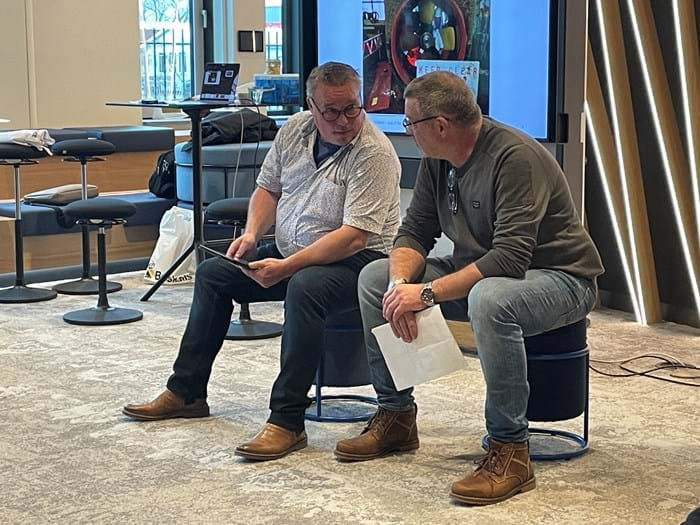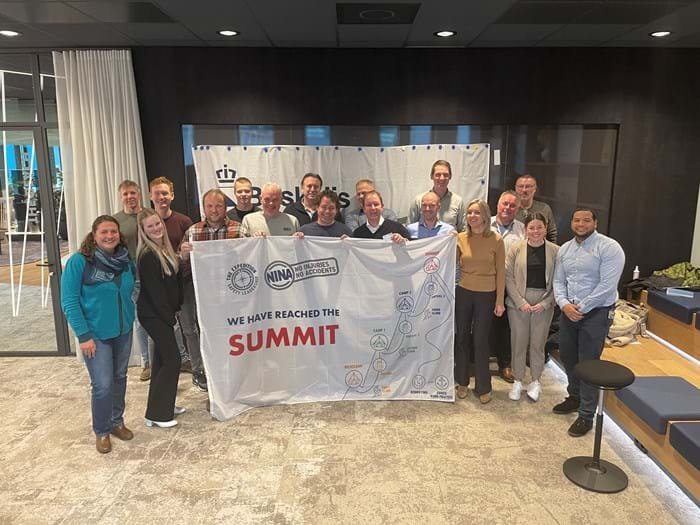“Let me introduce myself. I am Bouke Putter, working for Boskalis since 1997, of which the last 15 years in the role of Captain on the hoppers. In 2023, I started as participant in the NINA Safety Leadership Expedition which I completed on 14 December by doing my end presentation at the Summit session. Sharing my personal experiences and reflections was valuable for myself and the guests, and I therefore share my experiences in NINA at Work.“
“For the Summit presentation, I chose the topic ‘Safety Leader’. Why this topic? Because in my current function as Captain I am already a leader, the leader of my crew. A good leader in general, that people look up to, accept, and they trust the tasks which are given to them. And why is safety important to me? Simple: less accidents is always better.”
Who does Boskalis want me to be?
“During the Expedition, I wondered about something. What does Boskalis want with the Expedition and why is this important to the organization? The less accidents the better! Speaks for itself, I would say!
A question came to me directly: can I be a good captain and a safety leader for Boskalis at the same time? If I make decisions as a safety leader which will cost production, I feel it is not always appreciated by a project. If I make decisions as a captain that might lead to an accident, then I fail both as a safety leader and as a captain, in my opinion. And more, will Boskalis judge me on poor management and not thinking safe minded
That is why I invited managers Andre van der Wiel, Ton van Schaik and Arjan Schrijen as my guests to the Summit. To hear how they view the role of safety leader and captain: as equally important, or is one more important than the other? For myself, I knew the answer to the question, but I also wanted to hear it from these colleagues in the office who I work with the most.
Our management made a big statement: "We strive for zero accidents". They reached out to us to step up and be more safety-minded at work to reduce accidents as much as possible, even when it also costs production. If the higher management supports this Expedition, and thus supports us, it shows that this is serious to them, and all employees will be convinced as well.”
Sharing the same dilemmas and experiences
“At the beginning of the Expedition, I really had no clear view of where this should lead, but gradually I realized it is a safety management course.
In the past, I already did leadership management courses where similar topics were discussed. Still, it is always interesting to keep in mind that when you try to achieve something, you have to change yourself or your own approach instead of trying to change the other person.
What I also liked is that people from the whole organization join the sessions. Talking to others makes you realize that so many people have the same dilemmas and experiences, so there is much to learn from each other.
For me it was very recognizable that on the topic of ‘open and honest communication’, lots of colleagues from vessels felt they were being perceived as ‘negative’ when they spoke out to the office. Personally, I think that as an organization we need to be careful here. I experienced this myself, when making a comment on Making the Difference Together. While it was intended as open and honest feedback, it was received as negative feedback.”
“I hope the Expedition will help to improve communication between vessels and the office. That open and honest communication also leaves room for critical feedback, even though it might lead to conversations that might seem uncomfortable at first. Open communication goes both ways. On board, we prefer to receive honest answers. Rather be clear than beat around the bush. No is also a good answer.”
A big reach out to us all
“A personal insight of this Expedition is that this leadership journey is a big step. A big reach out to us to work more safely, even if it costs time or money. The more I was thinking about this message, the more I got impressed. To me, it is a huge step the company is making and now we all have to work on it. Small steps by everybody are steps in the good direction.
I see this Expedition as a powerful tool to discuss things. Now, if I am struggling to arrange something which is safety related, I will use this Safety Statement for dialogue. This makes me think more safety-minded, which makes it a very powerful tool, I would say.”
Andre van der Wiel, Director Operations Dredging: “At Bouke's invitation, I was present at his final (Summit) presentation. I could see that it took him effort and courage to speak in front of the guests. As I listened to his story, I realized and felt more and more how valuable his words were. His dilemma is my dilemma, our dilemma. To me, safety is black and white, and at the same time it can feel grey. This shows the importance of keeping the dialogue going about this. I also heard his call for more involvement. Being critical is not negative. It already shows involvement.”
Arjan Schrijen, Fleet Manager Dredging: “Bouke shared a clear story, very well said and recognizable. What stood out for me is the importance of following the lines of communication, no matter how difficult the dilemma may seem or the conversation might feel. In challenging moments, what matters most is that we are all really willing to understand each other. And try to find solutions together.”
Ton van Schaik, Director HR Fleet Management Dredging: "I very much appreciated that Bouke invited me to his Summit. What I really liked about Bouke is that, beforehand, he wanted to make sure his words were not too critical or miscomprehended. I assured him that as long as the issues you raise come from a good intention and genuine concern, it shows your involvement and care. Especially when it comes to safety. Ultimately that’s what is all about, production must go hand in hand with safety so everyone returns home safe!”
The NINA Expedition is a ‘learning-by-doing’ program to develop safety leadership, and at the same time, to work on actual safety dilemmas. Strengthening our safety culture requires specific leadership behavior to develop openness and trust. Courage is part of leadership and if we value this openness, courage grows into trust. As much as we need all employees to ‘speak up’ to address and discuss safety issues, we also need our leaders to ‘invite’ others to speak up. Together, we keep building a safe company.


